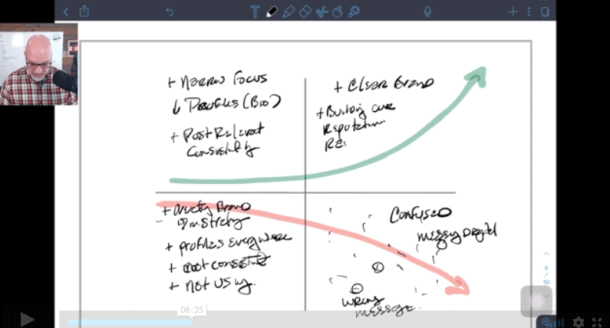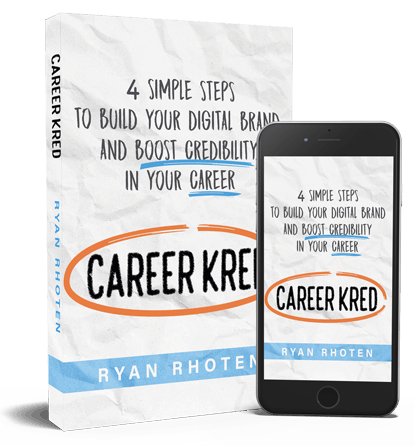How do you feel about this question; what do you want to do when you grow up?
I don't like this question. For me, it's too permanent. It implies we have to pick something and stick to it. Change is not an option.
I prefer this question; what do you want to be known for?
Notice the difference? The first question, seems more permanent, while the second question is more fluid, dynamic.
Speaking of question two, have ever thought about it? What would you like to be known for, say, in two years?
If you're like most of my clients, you probably haven't thought much about it which means you may be unaware of the brand you have inadvertently created for yourself.
Whether you realize it or not, you are a brand.
Interestingly, as brands (personal and business) we do not control our brand; others do.
We can influence the perception others have of our brand by taking charge of it, but ultimately as Jeff Bezos famously said,
“Your brand is what others say about you when you're not in the room.”
For those in professional roles working in an organization, “others” include your peers, your boss, and those “above you.” These folks control your brand and in many cases your career prospects.
For business owners, your “others” are your customers or your audience. The same is true for personal brands who use their skills and expertise to serve others, by way of a side gig or freelance work.
While none of us have ultimate control over our brands, we can influence how others perceive our brands by taking steps to build a brand that will help us become known for something.
The most extensive section of my book CareerKred is the Define step.
The entire purpose of this step is to help you define your brand and answer the question; what do you want to be known for?
As you go through the process of defining your brand, you will uncover the three critical pieces needed to set yourself apart from the crowd and stand out in an increasingly noisy and competitive world.
These essential pieces are your brand, your audience, and your positioning.
Your Brand – Why you do what you do
The most common question I get asked by my audience is; what is my brand?
Here's the most straightforward answer I give you to this question. Your brand is you. Your brand is the combination of all your skills, traits, values, and experiences.
Your brand is formed in the minds of others by the interactions you have with them on a daily basis as you demonstrate your skills, traits, values, and experiences.
Understanding what your brand is today in the eyes of others, is the key to unlocking your credibility and increasing the number of opportunities that come your way.
It may help to think of your brand as your ethos. It's why you do the things you do. It's why you gravitate towards certain things and why other things repel you.
Understanding your brand is a must when determining what you want to be known.
When we get stuck in our careers, when we start to question what comes next, that's when we are out of alignment. That's when what we want to be known for vs. what are doing, conflicts.
Fixing this requires aligning your actions towards your aspirations (what you want to be known for) and your audience.
Audience – Who you serve
As a brand, whether you call them peers, bosses, customers, clients, audience, or hiring managers, your audience is the group of “others” who control your brand.
Your audience pays attention to what you do and what you say. Your audience scans your words and observes your actions trying to answer one question, can you help me overcome my problems?
If they deem the answer to be yes, then you win business, you get promoted, and you increase your credibility in their eyes.
If on the other hand, they deem to answer to be no, then you have not positioned yourself as the solution to their problems.
Position – How you do what you do
An interesting thing happens as you define your brand and discover your audience. You also determine your positioning.
Think of positioning as how you help your audience overcome their problems.
To define your positioning, you need to understand what is unique about your brand, and how you serve your audience differently from your competition.
The right positioning will deliver a message that resonates and will draw the right audience to you. It will also, repel the wrong audience.
Speaking of message, a cool thing comes at the intersection of brand, audience, and positioning. That cool thing is your message.
Message – Clearly communicates who you are and how you add value.
At the core of everything you do, as you build a brand you want to become known for, is your message.
When done correctly, your message will communicate to others who you are and how you add value. Unfortunately, messaging is where I see many brands falter even after completing all of the hard work defining their brand, audience, and positioning.
The most common mistake I see brands make with messaging is using industry jargon, acronyms, and abbreviations that, frankly, most people do not understand.
Jargon kills even the best branding efforts.
At every opportunity you get, you should strive to speak clearly to your audience, using their language. Your words should always boost the confidence of your audience, not just in your ability to help but also in their ability to comprehend your message.
A clear message will beat a clever one every day, and jargon rarely helps raise anyone's confidence.
In fact, the use of industry jargon can make people feel inferior because they do not know or understand what it means. As a result, they spend too much time trying to figure it out and ultimately, they check out.
When this happens, everyone loses. They lose an opportunity to change their business, and you miss a chance to serve others.
Borrowing words from Bob Newhart, if you use jargon in your message today, “Stop it!”
Video borrowed from viroquavinny
In my book CareerKred, I spend a lot of time in the Define step, guiding you through determining what you want to be known for.
Understanding this is essential to your career success, whether you are a business or a personal brand. Understanding what you want to be known for, aligns your actions with your aspirations and ultimately to your success as well.
Define what you want to be known for, start moving in that direction, and you'll be surprised by how quickly you can boost credibility in your career.





